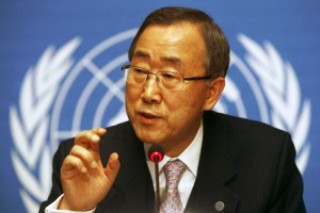UN Chief urges South Africa to reconsider quitting ICC
October 31, 2106 (KHARTOUM) – The United Nations Secretary-General Ban Ki-moon regretted the South Africa’s decision to leave the International Criminal Court (ICC) and expressed hope that it would reconsider the decision before the withdrawal takes effect.

Last year, South Africa’s government said it is planning to withdraw from the tribunal after it was criticized for failing to arrest the visiting Sudanese President Omer al-Bashir who stands accused by the ICC of genocide, war crimes and crimes against humanity.
Also, on 26 October, Gambia announced that it will withdraw from the ICC, the third African country to declare its departure in just two weeks.
In a telephone conversation with South Africa’s President Jacob Zuma on Sunday, Ki-moon pointed to the key role played by South Africa’s government in the negotiations that led to the adoption of the Rome Statute of the ICC and as one of its first signatories.
According to a press release issued by his office, UN Secretary General also noted his appreciation for the continued and unwavering commitment of South Africa’s government to justice and accountability and expressed hope that it would reconsider its decision before the withdrawal takes effect in twelve months’ time.
On Saturday, ICC’s chief prosecutor Fatu Bensouda described decisions by three African countries to withdraw as a “setback”, vowing that the tribunal will continue its work on the continent.
“You could expect a setback as the ICC started to make more progress,” she said.
But “I don’t believe we should feel defeated and that the ICC is going to close up tomorrow,” added Bensouda, in her first reaction to the shock announcements by Burundi, South Africa and the Gambia to leave the Hague-based court.
Several African governments and the African Union (AU) have voiced concerns over the ICC’s fairness, and accused it of targeting African leaders.
They further to say that war crimes court has violated its founding treaty the Rome Statute, when it prosecutes cases investigate by the national jurisdiction.
Last July, the 27th AU summit held in the Rwandan capital Kigali did not call for a mass withdrawal from the court, despite calls by several African leaders including Sudan. However, an African Union ministerial committee is debating the issue and is expected to present reform demands at the next meeting of ICC assembly of states parties, in November.
Established in 2002 to try war criminals and perpetrators of genocide never tried at home, the ICC has opened inquiries involving nine nations, including Kenya, Ivory Coast, Libya, Sudan, Democratic Republic of Congo, Central African Republic, Uganda, Mali and, most recently, Georgia.
(ST)
